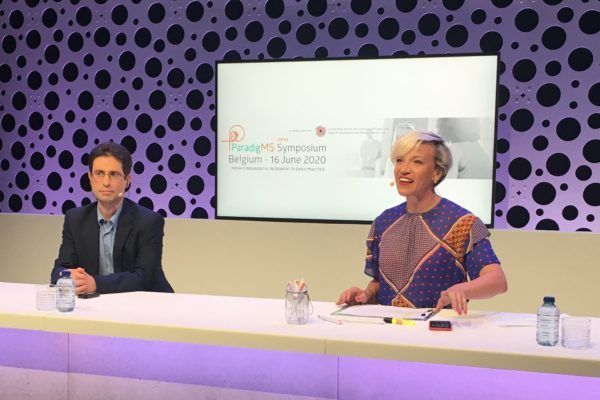Biomarkers in MS & Epidemiology of MS
16th of June 2020, Fifth ParadigMS Symposium. The ParadigMS Foundation and the Belgian Study Group for Multiple Sclerosis (BSGMS) organised for the first time an interactive and fully digital learning experience. Here you can review the full webinar on Biomarkers in Ms & Epidemiology of MS.
ABSTRACTS
BIOMARKERS IN MS
NIKOLAOS GRIGORIADIS
Multiple Sclerosis is an autoimmune, multifactorial disorder with its main hallmarks the persistent neuroinflammation and chronic neurodegeneration. Despite its extensive study, the lack of reliable and specific biomarkers for the disease makes it difficult to achieve differential diagnosis and delays early treatment. The disease is also characterized by high heterogeneity, a factor that complicates the process of finding suitable biomarkers. A number of biomarkers such as the anti-Aquaporine 4, the anti-MOG Abs are among those currently being used for the differential diagnosis of CNS demyelinating processes, the anti-JCV Abs for the safe administration of DMTs, particularly natalizumab (NTZ) treatment together with the anti-NTZ neutralizing Abs in case of treatment failure are well established for the daily clinical practice. Interestingly enough, there is increasing evidence indicating that the plasma neurofilament light chain (pNfL) concentrations in relapsing remitting multiple sclerosis (RRMS) may be a valuable biomarker reflecting the neurodegenerative process which underlies the corresponding disability progression. Moreover, recent reports provide evidence that the choice of disease modified treatment in
RRMS is significantly associated with degree of reduction in pNfL, which supports a role for pNfL as a drug response marker. In addition, all “omics” approaches are high throughput, data-driven, and holistic methodologies and metabolomics in particular may be used for the discovery of biomarkers. Metabolomics use the means of cutting-edge technologies, like NMR and MS, in the analysis of high throughput data and following the requirements of personalized medicine aims to a patient-tailored healthcare. Also, seeks to capture the complexity of metabolic networks, create a personalized metabolomic profile for the disease and the final
goal is to identify metabolites that can be used as candidate biomarkers in daily clinical practice. Those biomarkers will contribute not only in prognostic evaluation but also as a mean of monitoring the disease or treatment efficacy.
The implementation of soluble as well as novel imaging biomarkers may complement current clinical and imaging monitoring. However, the road map to establish a molecule as potential biomarker in a complex disease such as MS is a long one. On the other hand, it may be the only way to develop a precision medicine approach in the overall management of the
disease.
EPIDEMIOLOGY OF MS
CARLO POZZILLI
Multiple sclerosis (MS) is a major cause of neurological disability with a considerable socioeconomic burden. This presentation provides an overview of recent estimates of the worldwide prevalence and incidence rates, of changes in the distribution MS by age and sex, as well as looking at some recent advances in understanding of environmental epidemiology and the natural history of MS.
Although MS is present in all regions of the world, the incidence and prevalence is higher in some countries than in others. This is occurring in populations at high risk (such as Sardinia) and in those at low risk (such as Norway), suggesting that, whatever the causative factors of MS may be, their influence appears to increase.
In addition, an increase in the female/male ratio has been demonstrated over time in many countries around the world. One of the most striking indicators of a potential environmental role has always been considered to be the gradient of MS prevalence with latitude.
Susceptibility to MS is complex, with evidence supporting both genetic and environmental factors, with genetic effects shaping the population risk for MS. A major supporting factor for a genetic effect is the positive family history of MS observed in 20% of all patients of European descent and
estimates of MS heritability (the proportion of phenotypic variance attributable to heritable factors)range from 25 to 76%. Although epidemiological studies provide evidence of a genetic basis, the specific gene or genes remain elusive.
A large number of environmental or lifestyle factors have been identified to play a role in MS including smoking, pre-pubertal diet, childhood obesity, pollution, exposure to the Epstein-Barr virus and low exposure to sunlight (mediated through vitamin D insufficiency). A number of studies support
a significant role for hypovitaminosis D as a risk factor for multiple sclerosis. Additional research is needed to conclusively prove which factors are important in increasing the risk of MS.





